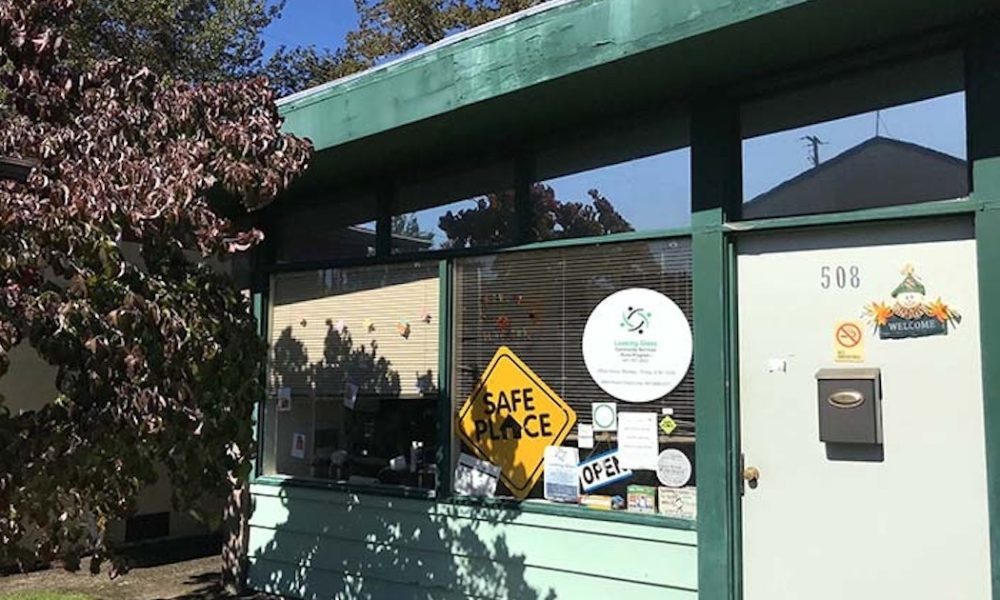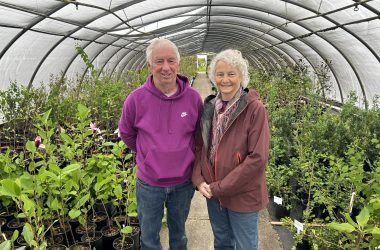 Looking Glass has purchased this space at 620 E. Whiteaker Ave. to better support the homeless and runaway youth in the area. JEN BLUE/THE CHRONICLE
Looking Glass has purchased this space at 620 E. Whiteaker Ave. to better support the homeless and runaway youth in the area. JEN BLUE/THE CHRONICLE
COTTAGE GROVE – Family stress can come in many forms when a parent loses their job or housing costs upset the stability of having a ”home.” Financial stress, particularly for low-income families, can force people to make difficult decisions such as moving into their car or into a campground for their residence.
The ripple effect of these stresses has been well-documented: Children in these situations suffer from increased anxiety and depression, and become more susceptible to compensating with drug use and other unhealthy choices.
Help from community volunteers and neighbors is, literally, lifesaving.
The Homeless and Runaway Youth Center in Cottage Grove – operated by Looking Glass – wants to get involved and offer services focused on youth. Looking Glass volunteers will do their best to connect children with the services they need, as well as keeping the family involved.
”There are quite a few stories like that,” Craig Opperman, CEO and president, said: ”They’ve slipped out of being okay to having severe issues in staying independent.”
To better support the homeless and runaway youth in the area, Looking Glass has purchased a larger space at 620 E. Whiteaker Ave. in Cottage Grove. According to a 2018 report on Lane County’s sheltered and unsheltered residents, Looking Glass’ New Roads Access Center served 503 homeless youth in 2017.
”With the new facility, we’ll have a much better space,” Opperman said. ”The inside is quadruple the size we have now. There’s more availability to store safety-net needs and more space for counseling. That’s why we’re excited about it.”
Those safety nets include a clothing closet and a laundry room, along with counseling services for addiction. He added that there will also be an outdoor area that can be used for counseling.
Looking Glass has been in service since the 1970s, when a group that included University of Oregon students wanted to serve homeless youth. Over the years, the programs that Looking Glass offers have only expanded. They are the only nationally accredited homeless and runaway youth center in Oregon. Their shelters house youths ages 11 to 18 and Looking Glass is the only shelter accredited by Lane County. It is also the only ”Safe Place” center in Oregon, and has been nationally recognized for the work it’s doing.
”We have consistently learned and grown and there’s no end to that,” Opperman said.
Although Looking Glass is recognized throughout Eugene and Springfield, Opperman said it’s also important to them to serve the surrounding rural communities. The nonprofit even runs two schools that focus on autistic students and students with behavioral problems, which teaches students from Cottage Grove and Creswell.
”Rural communities are their own culture that are often underserved,” he said. ”It’s hard for them to get attention because their numbers aren’t as great in urban areas, but the needs are significant. Per capita, the needs based on an area, rural communities have just as much if not more.”
He added that the problem of homelessness and runaway youth is less readily acknowledged because it’s usually less visible. Adolescents will couch surf and be homeless without living on the street, until that option falls through.
”The goal is to unite families,” Opperman said, ”and if that can’t happen, we look at alternatives – does the state need to get involved?”
He said that over half of the young people who run away will be returned successfully to their families, and that helps prevent future homelessness. Looking Glass will work with the family unit to keep it as healthy as possible going forward.
”These young people are extremely vulnerable,” Opperman said, citing sex trafficking as a possibie threat. ”When a teenager is on the street, they are still vulnerable to violence based on their environment.”
Looking Glass works with a sex-trafficking specialist, and their Runaway and Homeless Youth Servies director and manager Kirstin London also has experience working with trafficking survivors.
”The reality of working with runaway or homeless youth in Lane County is that it’s not against the law to run away or kick a young person out. The fact of being on the street intensifies the risk for being trafficked,” she said.
She added that the organization is working intense cases and are in touch with the State of Oregon, Kids First, the State Attorney and the Federal Bureau of Investigation. Looking Glass works from the survivor’s standpoint, but one of the biggest problems is that even if the nonprofit knows who is doing the trafficking, that doesn’t mean there’s enough evidence to prosecute them.
London explained that often there is a lack of money exchanged to the survivor, which will make trafficking cases more challenging. She said that in some cases a homeless student will live with older, former students and when rent increases or money runs out, a suggestion of ”’sleep with so-and-so instead of paying rent,’ and that could turn into trafficking.”
She cited an encampment in Eugene that had a group of young people being trafficked. She said that the teenagers will think they’re going to a dinner but are instead trafficked.
Unlike public perception, trafficking is done behind a screen, London said. It’s not the image of someone working a street corner; instead, it’s a large truck parked outside a building with an older man hanging out all day.
Sometimes, even Looking Glass’ clients are traffickers. London said in those situations the nonprofit will still provide services to that person, but will have a conversation about how to make it a safe place for their survivors to come in, and then make those connections.
The one thing it all comes down to is relationships, London said. People think that a survivor will come into the office and reveal everything.
”But studies and experiences show that it’s a marathon,” she said. ”It could take up to a year to disclose anything.”
For these reasons, helping these youths connect again with their family or with a service to help them is crucial. Opperman said it’s good to see them come away from the fringe and move into a place where they are safe and healthy.
”It’s taking someone who is really having a tough turn or are dealing with trauma, and putting them back on a healthy and successful path,” he said. ”It’s so rewarding to see that happen. It’s most rewarding when a family unit ends up healthy and happy, and moving forward into the right direction together again.”








